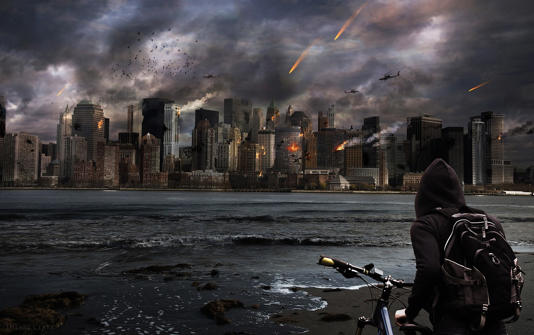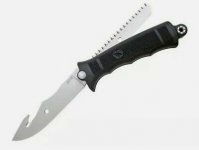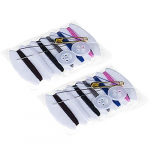BigFootsCousin
Molon Labe!
^^LINK^^
Fair Use-
Story by Emily Standley • 5h

Doomsday© Image by Pixabay.com
In the words of Benjamin Frankling, "By failing to prepare you are preparing to fail." I don't want to sound like 'Chicken Little' but planning for a societal collapse is not necessarily outside the realm of possible reality. It was but only a few decades ago that bartering existed as a common practice that families relied upon for survival. For centuries, bartering has been key to human sustainability, and in the event of an economic collapse, or other potential catastrophe, bartering staple goods will likely return in full force. Here is a list of 90 items you can start collecting today that have been used as currency and traded to be much more prepared for whatever is to come.
Creating your stockpile now therefore could help you prepare for whatever might be headed our way. The best way to assess the value of items in the event of a societal collapse is to look at similar events in the past and attempt to understand the implications regarding how priorities change and radically alter demand and supply.
Note & Disclaimer: Certain items may be more critical for survival at any given time than others depending upon the situation. This post is for informational purposes only. It contains some affiliate links which help us to create more articles. If you make a purchase, we will earn a small commission with no additional charge to you.
Protection & Utility
Sporting Gear, Chemicals & Tools
Animals and Livestock
Clothing & Shelter
In a societal collapse, apocalyptic or doomsday scenario, items that are essential for survival, such as food, water, and medication, would likely be the most valuable.
Additionally, items that have more practical applications, such as tools, building materials, and protective clothing, would be highly valuable for their ability to enable individuals and communities to sustain themselves further in the long term.
Items that have cultural or symbolic significance, such as precious gems or tobacco, may also have a high worth value as tradeable goods.
Finally, many metals and construction materials would increase in value as society begins to re-establish itself once more as many have in the past.
--------------------------------------------------------------------------------------------
BFC- This seems like a better list than we usually come across. I'm going to have to re-read it again.
Fair Use-
Story by Emily Standley • 5h

Doomsday© Image by Pixabay.com
In the words of Benjamin Frankling, "By failing to prepare you are preparing to fail." I don't want to sound like 'Chicken Little' but planning for a societal collapse is not necessarily outside the realm of possible reality. It was but only a few decades ago that bartering existed as a common practice that families relied upon for survival. For centuries, bartering has been key to human sustainability, and in the event of an economic collapse, or other potential catastrophe, bartering staple goods will likely return in full force. Here is a list of 90 items you can start collecting today that have been used as currency and traded to be much more prepared for whatever is to come.
Creating your stockpile now therefore could help you prepare for whatever might be headed our way. The best way to assess the value of items in the event of a societal collapse is to look at similar events in the past and attempt to understand the implications regarding how priorities change and radically alter demand and supply.
Note & Disclaimer: Certain items may be more critical for survival at any given time than others depending upon the situation. This post is for informational purposes only. It contains some affiliate links which help us to create more articles. If you make a purchase, we will earn a small commission with no additional charge to you.
Metals and Gems
- Gold - A highly sought-after precious metal that has been used as currency for thousands of years due to its rarity, durability, and intrinsic value.
- Silver - Another precious metal that has many industrial uses in addition to being used as a form of currency.
- Platinum - A valuable metal with a variety of industrial uses, including in the production of catalytic converters for cars.
- Precious gems - Rare and beautiful stones that have been treasured for their aesthetic appeal, healing power and symbolic value for centuries.
- Copper - An important industrial metal that is used in a wide range of applications, from electrical wiring to plumbing.
- Aluminum - A lightweight, corrosion-resistant metal that has many industrial uses, including in the production of airplanes and cars.
- Iron - A strong, durable metal that has been used for centuries in construction, tools, and weapons.
- Steel - A versatile metal that is widely used in construction, manufacturing, and transportation due to its strength, durability, and ability to be easily shaped.
- Nickel - A hard, silvery-white metal that has many industrial uses, including in the production of stainless steel and batteries.
Food and Beverages
- Water - A basic necessity for human survival that is essential for drinking, cooking, and hygiene.
- Canned foods - Bulk supply of long-lasting food that can provide essential nutrients years after initial manufacture.
- Freeze dried food - lightweight, compact and portable food with extremely long shelf lives of up to 30 years.
- Water filters or water purification tablets - methods of ensuring access to clean and safe drinking water.
- Salt - A mineral that has been used for centuries as a seasoning and food preservative.
- Sugar - A sweetener that is used in cooking and baking.
- Coffee - A popular beverage that is consumed around the world and has a high value due to its stimulating effects and rich flavor.
- Tea - Another popular beverage that is consumed around the world and has many health benefits.
- Cocoa - A key ingredient in chocolate that is also used in a variety of desserts and beverages.
- Spices - Spices such as cinnamon, pepper, cloves, and nutmeg have been traded for centuries and have a high value due to their rarity and ability to add flavour and aroma to food.
- Seeds - The reproductive material of plants that is used for growing crops.
- Honey - A sweet food produced by bees from the nectar of flowers.
- Wine - A type of alcoholic beverage that is made from fermented grapes and has been enjoyed for centuries due to its complex flavors and health benefits.
- Whiskey - A distilled spirit that is made from fermented grains and has a complex flavor profile and high alcohol content.
- Vodka - A distilled spirit that is made from grains or potatoes and is known for its purity and neutrality of flavor.
- Brandy - A distilled spirit that is made from wine and has a high alcohol content and complex flavor profile.
- Rum - A distilled spirit that is made from fermented sugarcane or molasses and has a unique flavor profile and cultural significance in many parts of the world.
- Gin - A distilled spirit that is flavored with botanicals, particularly juniper berries, and has a distinctive flavor profile that is enjoyed in a variety of cocktails.
Fuel
- Diesel - A type of fuel that is used in diesel engines, which are commonly used in trucks and other heavy-duty vehicles.
- Natural gas - A clean-burning fossil fuel that is used to produce electricity and heat buildings.
- Coal - A fossil fuel that has been used for centuries to generate electricity and heat buildings.
- Charcoal - A form of carbon that is produced by burning wood in the absence of oxygen, which is used as a fuel and in the production of steel.
- Petrol - A refined product of crude oil that is used as fuel for cars, trucks, and other vehicles.
- Batteries - Used for providing power to a wide range of portable devices from torches to handheld tools and communication devices.
Medications & Medical Supplies
- Medications - A variety of pharmaceutical products that are used to treat and prevent illness and disease.
- Antibiotics - Medication or ointment that are used to treat bacterial infections and have revolutionized the treatment of many illnesses and diseases.
- Pain relief - Medications that are used to alleviate pain and discomfort caused by a variety of conditions, injuries, and surgeries.
- Vitamins - Essential nutrients that are necessary for maintaining good health and preventing disease.
- Anti-inflammatory drugs - Medications or creams that are used to reduce inflammation and swelling caused by a variety of conditions.
- Antacids - Medications that are used to reduce acidity in the stomach and relieve symptoms of heartburn and indigestion.
- Antihistamines - Medications that are used to relieve symptoms of allergies and anaphylactic allergic reactions.
- Insulin - A hormone that is used to regulate blood sugar levels in people with diabetes.
- Oxygen tanks - A device that stores and delivers oxygen for people with respiratory problems or in emergency situations.
- First Aid Kit - Useful for all minor cuts, scrapes and abrasions.
Protection & Utility
- Guns - Weapons that use explosive force to fire projectiles, which can be used for hunting, self-defense, or military purposes.
- Ammunition - The bullets or shells that are used in guns.
- Knives - Tools that are used for cutting, slicing, cleaning and chopping.
- Axes - Tools that are used for chopping wood and other materials.
- Crossbow/Bows and arrows - Weapons that use tension to fire projectiles, which can be used for hunting or warfare.
Sporting Gear, Chemicals & Tools
- Fishing gear - Equipment that is used for catching fish, including fishing rods, nets, and bait.
- Hunting gear - Equipment that is used for hunting, including firearms, and hunting knives.
- Animal traps - Devices that are used to capture animals for food or other purposes. Humane is best!
- Fertilizer - Substances that are added to soil to promote plant growth.
- Pesticides - Chemicals that are used to kill or control pests, such as insects and rodents.
- Farming tools and equipment - Tools that are used for cultivating crops, including seed drills, cultivators and tractors.
- Shovels - A tool used for digging, lifting, and moving loose materials such as soil, gravel, or snow.
- Hoes - A tool used for cultivating and shaping soil.
- Scythes - A tool used for cutting grass, weeds, or other vegetation.
- Sickles - A tool used for harvesting grain crops, such as wheat or barley.
- Wheelbarrows - A small hand-propelled vehicle with one wheel, designed for carrying small loads, such as dirt, gravel, or bricks.
Animals and Livestock
- Horses - A domesticated mammal used for transportation, ploughing fields, and other agricultural purposes.
- Donkeys - A domesticated mammal used for transportation, particularly in arid or mountain like regions.
- Mules - A hybrid animal produced by crossing a male donkey with a female horse, used for transportation and agricultural purposes.
- Cows - A domesticated mammal used for producing milk, meat, and leather.
- Chickens - A domesticated bird used for producing eggs and meat.
- Goats - A domesticated mammal used for producing milk, meat, and fiber.
- Sheep - A domesticated mammal used for producing wool, meat, and milk.
- Pigs - A domesticated mammal used for producing meat and other products.
- Bees - Insects that produce honey and are vital for pollinating plants.
Materials
- Wax - A natural substance produced by bees that is used in the production of candles and other products.
- Leather - A material made from the skin of animals, commonly used for making shoes, clothing, and other products.
- Fur - The soft, thick hair of certain mammals, commonly used for making warm clothing.
- Wool - The soft, curly hair of sheep or other animals, commonly used for making clothing and blankets.
- Silk - A luxurious fabric produced from the cocoons of silkworms.
- Cotton - A soft, fluffy fiber that is grown on cotton plants and used for making clothing and other textiles.
- Linen - A fabric made from the fibres of the flax plant, commonly used for making clothing and household textiles.
- Hemp - A fiber that is derived from the cannabis plant, commonly used for making textiles, paper, and other products.
- Tobacco - A plant that is dried and smoked for recreational and medicinal purposes.
- Lumber - Wood that has been cut and processed for use in construction and for heating, cooking and building.
- Bricks - Blocks of baked clay or other materials used for building walls, for plants and other structures.
- Cement - A binder used in construction that hardens and binds other materials together - useful for building permanent structures and shelters.
Clothing & Shelter
- Robust Clothing - Garments worn on the body for warmth and protection.
- Shoes - Flexible footwear worn for protection and comfort.
- Boots - Covering a wide range of footwear designed for both indoor and outdoor comfort and protection.
- Face masks - A protective covering that is worn over the nose and mouth to reduce the spread of disease and infection.
- Protective clothing - Clothing that is designed to protect the wearer from harm, such as hazmat suits and body armor.
- Hats - Head coverings worn for warmth and protection.
- Gloves - Sturdy hand coverings worn for warmth, protection, and dexterity.
- Blankets - A heavy duty large piece of cloth used for warmth and comfort, commonly used on beds and couches designed to last.
- Sleeping bags - A portable bed that consists of a large insulated bag, commonly used for camping and outdoor activities, but more critical in the event of power outages.
- Tents - A portable shelter made of fabric or other materials, commonly used for camping and outdoor activities.
Conclusion
It's important to note that the value of these items to barter can vary depending on the specific circumstances and needs of a given situation.In a societal collapse, apocalyptic or doomsday scenario, items that are essential for survival, such as food, water, and medication, would likely be the most valuable.
Additionally, items that have more practical applications, such as tools, building materials, and protective clothing, would be highly valuable for their ability to enable individuals and communities to sustain themselves further in the long term.
Items that have cultural or symbolic significance, such as precious gems or tobacco, may also have a high worth value as tradeable goods.
Finally, many metals and construction materials would increase in value as society begins to re-establish itself once more as many have in the past.
--------------------------------------------------------------------------------------------
BFC- This seems like a better list than we usually come across. I'm going to have to re-read it again.



